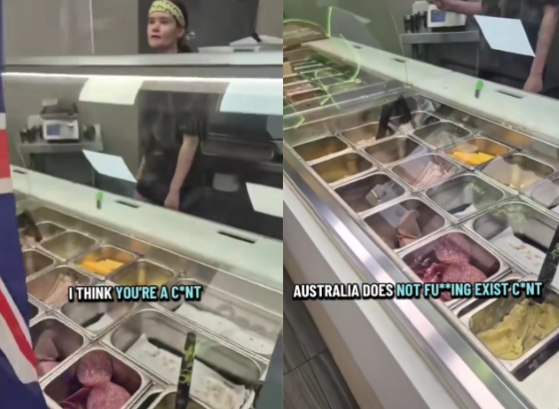
Content warning: This article contains offensive language and references to political extremism.
A Brisbane Subway became an unexpected flashpoint for Australia’s simmering political tensions.
What started as a simple lunch order quickly turned into a viral confrontation that has sparked nationwide debate.
On 31 August 2024, a Subway employee refused to serve customers carrying Australian flags, telling them the flag 'p***** me off' and calling them names too offensive to print in a family publication.
The exchange was filmed and shared widely, costing the worker her job and igniting debate over discrimination, workplace conduct, and political expression.
The customers had just attended the 'March for Australia' rallies, a series of protests across Australian cities that day.
Organisers framed the events as community concern about immigration policy, but critics and experts described them as far-right and white nationalist.
An ABC News investigation linked rally organisers to Neo-Nazi groups, including the National Socialist Network, whose leader Thomas Sewell spoke at the Melbourne rally.
'Nothing could be less Australian.'
Brett Sengstock, 33, attended the Brisbane march and decided to test the Subway employee after hearing reports of a similar incident.
The confrontation escalated quickly.
When asked why she refused service, the employee said bluntly: 'Because that flag p***** me off.'
She added: 'You've got a Union Jack flag and the people organising this are Nazis. They said bring the Eureka flag, which is white nationalism. This is black land.'
The worker continued, calling customers offensive names and saying: 'Australia does not f****** exist.'
Sengstock’s response, 'What's in your brain?' reflected the bewilderment felt by many viewers of the footage.
Australia's current immigration settings
Australia's permanent migration program was set at 185,000 places for 2024-25, down from 190,000 the previous year.
The skilled stream made up 71 per cent of this allocation (132,200 places).
Recent changes increased student visa fees to $2,000 and introduced stricter financial and English requirements.
Subway acted swiftly, confirming the employee had been terminated.
A company spokesman said: 'The conduct of the individual involved does not reflect the values or standards of Subway. The safety, dignity and comfort of every guest is paramount, and we do not tolerate discrimination, harassment or aggression of any kind.'
What this means for workers and businesses
- Employees can hold personal political views but cannot discriminate in service delivery
- Businesses must provide equal service regardless of customers' political affiliations
- Workers can be dismissed for conduct that breaches anti-discrimination policies
- Companies have a duty to maintain a welcoming environment for all customers
The incident occurred amid heightened tensions in Australian communities.
Influencers and community leaders had urged certain groups to stay home for safety, and social media posts warned of a 'dangerous' anti-immigration message on 31 August.
The government condemned the protests as 'Un-Australian.'
Prime Minister Anthony Albanese said: 'You're speaking to someone called Albanese. We've got a Senate leader called [Penny] Wong. Migration enriches. Except for the First Australians, we're all either migrants or descendants of them.'
The Scanlon Foundation’s late-2024 survey found social cohesion at a record low.
While most Australians support non-discriminatory immigration policies, anti-immigration attitudes correlated with economic and housing concerns rather than diversity issues, with 49 per cent believing immigration levels were too high.
Experts called common myths about migrants 'nonsense,' noting that fear of being left behind drives much of the sentiment.
The Subway incident reflects the challenge of navigating political polarisation in everyday life.
For older Australians, the episode may feel especially disconcerting, recalling a time when political debate was more civil and workplaces had clearer boundaries between personal beliefs and professional conduct.
What This Means For You
A Subway employee refused service to customers carrying Australian flags, an incident that quickly went viral and sparked widespread discussion.
The customers involved had attended far-right 'March for Australia' rallies, which were linked to Neo-Nazi groups, adding another layer of controversy to the confrontation.
In response, Subway terminated the employee and emphasised the importance of non-discrimination and ensuring the safety and comfort of all guests.
This episode highlights the growing political polarisation in Australia and the challenges businesses face in maintaining neutrality in everyday interactions.
For the audience, particularly those who have witnessed decades of social change, the incident may feel alarming—showing how political tensions can now enter even the most ordinary spaces, like a lunch counter, and prompting reflection on how civility and respect can be preserved in increasingly divided times.
The Subway flag incident highlights how political beliefs can quickly turn everyday interactions into heated confrontations.
A similar clash over free speech recently unfolded on national television, showing that disagreements over politics are not limited to workplaces or public spaces.
Exploring this story provides another perspective on how political expression can spark debate and controversy.
Read more: Former prime minister sparks fiery debate with TV host: 'We believe in free speech'
Subway Brisbane customer refused service over Australian flag — Reports on a viral incident where a Subway employee in Brisbane refused service to customers carrying Australian flags, sparking national debate on political expression and workplace conduct.
https://www.dailymail.co.uk/news/article-15124439/Subway-Brisbane-customer-Australia-flag.html
March for Australia — Wikipedia — Overview of the 'March for Australia' rallies held on 31 August 2025, including locations, purpose, and public reactions.
https://en.wikipedia.org/wiki/March_for_Australia
How the March for Australia anti-immigration rallies and counter-protests unfolded — Detailed account of the rallies and counter-protests, including violent clashes in Melbourne and the involvement of far-right groups.
https://www.sbs.com.au/news/article...llies-and-counter-protests-unfolded/3dtvd0csi
'Un-Australian': Government criticises 'March for Australia' rallies amid community fears | SBS News — Reports on government criticism of the rallies, warnings to immigrant communities, and social media alerts about safety risks.
https://www.sbs.com.au/news/article...t-warnings-to-immigrant-communities/kclvivwdu
These protests want to 'take our country back'. But the real issues run much deeper | SBS News — Analysis of underlying social and economic factors driving anti-immigration sentiment, including declining social cohesion and common myths about migrants.
https://www.sbs.com.au/news/article...but-the-real-issues-run-much-deeper/f3jcthbga
How do we maintain civility in public spaces when personal beliefs collide with professional duties and community tensions?







